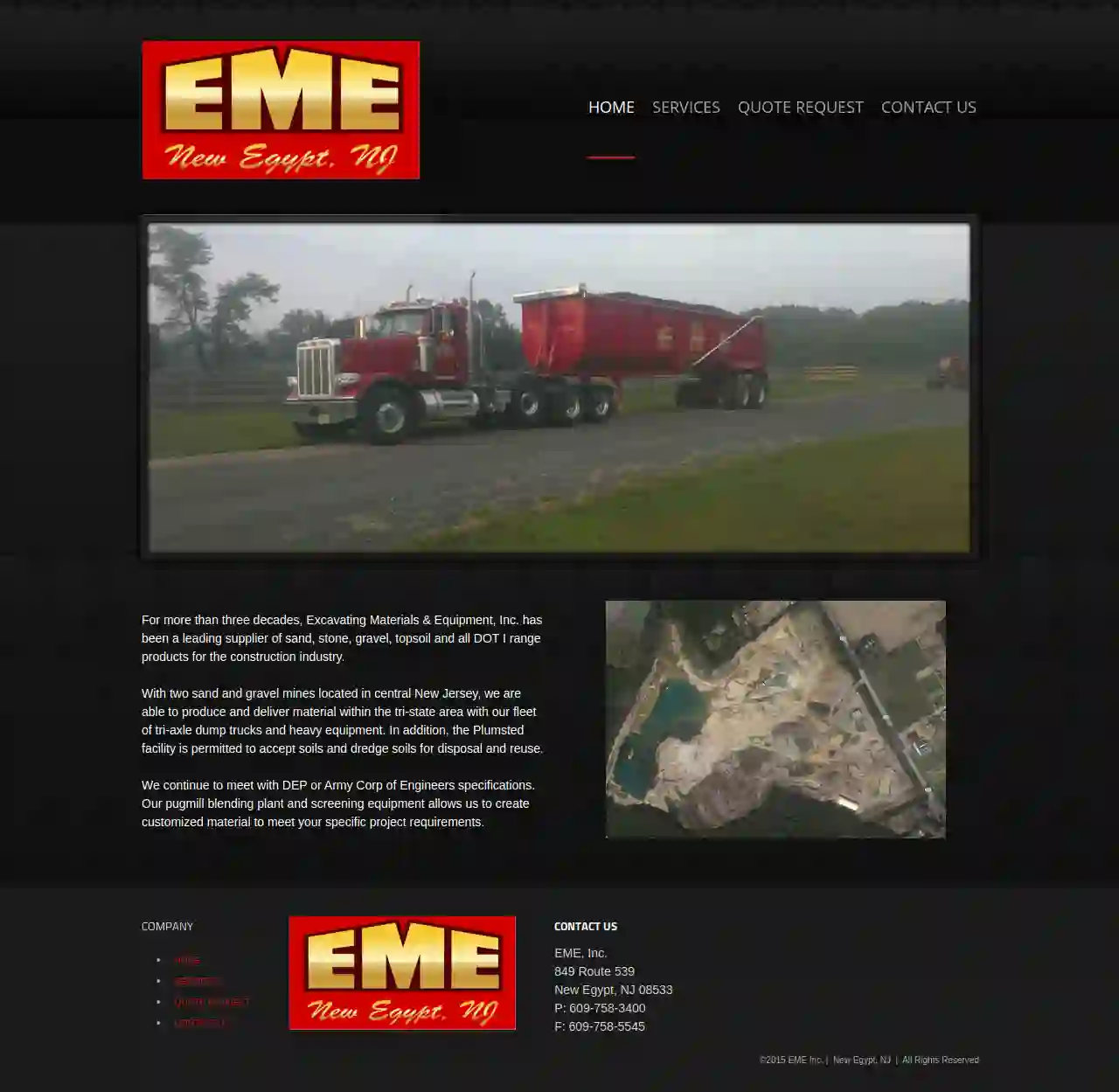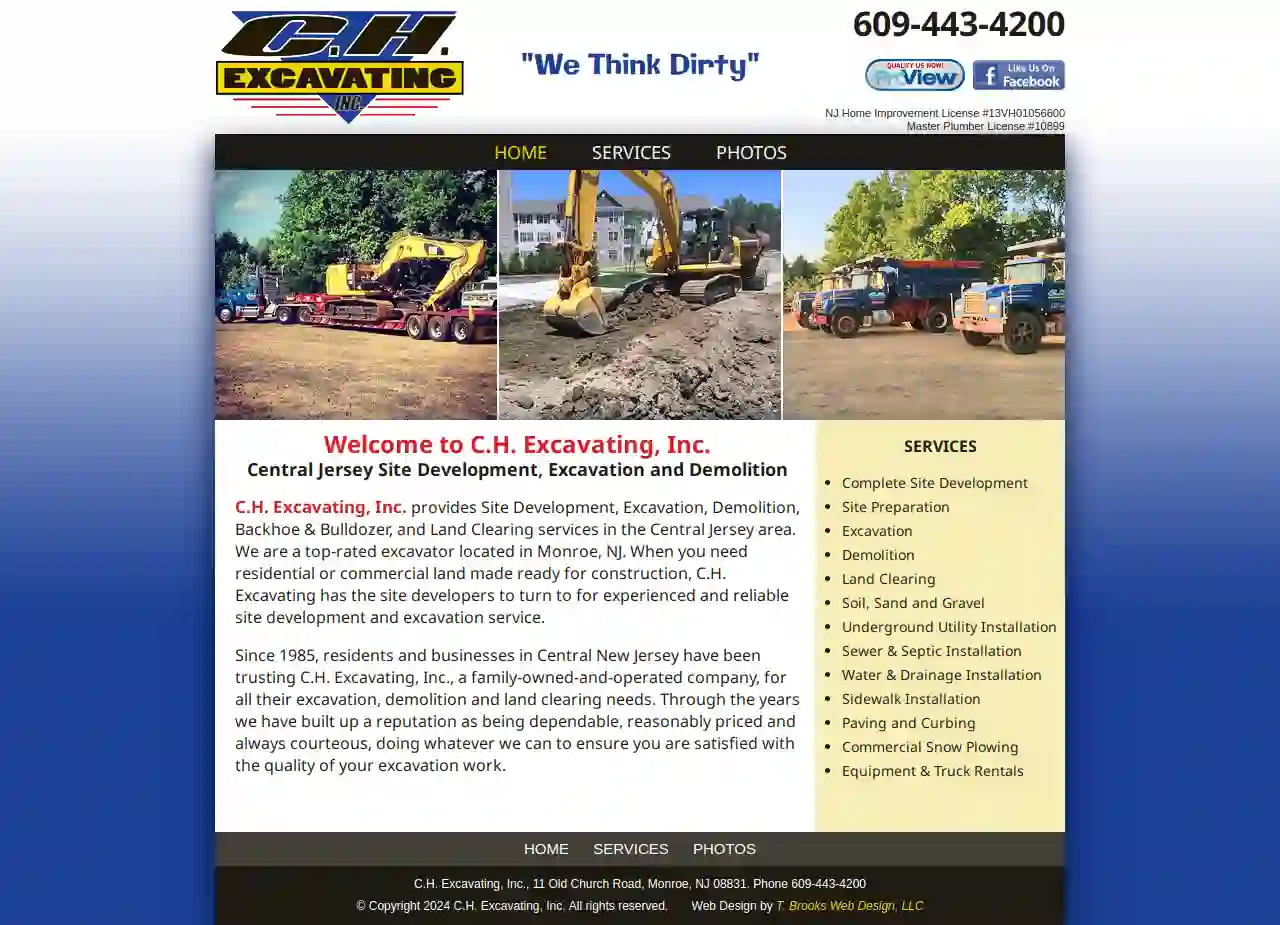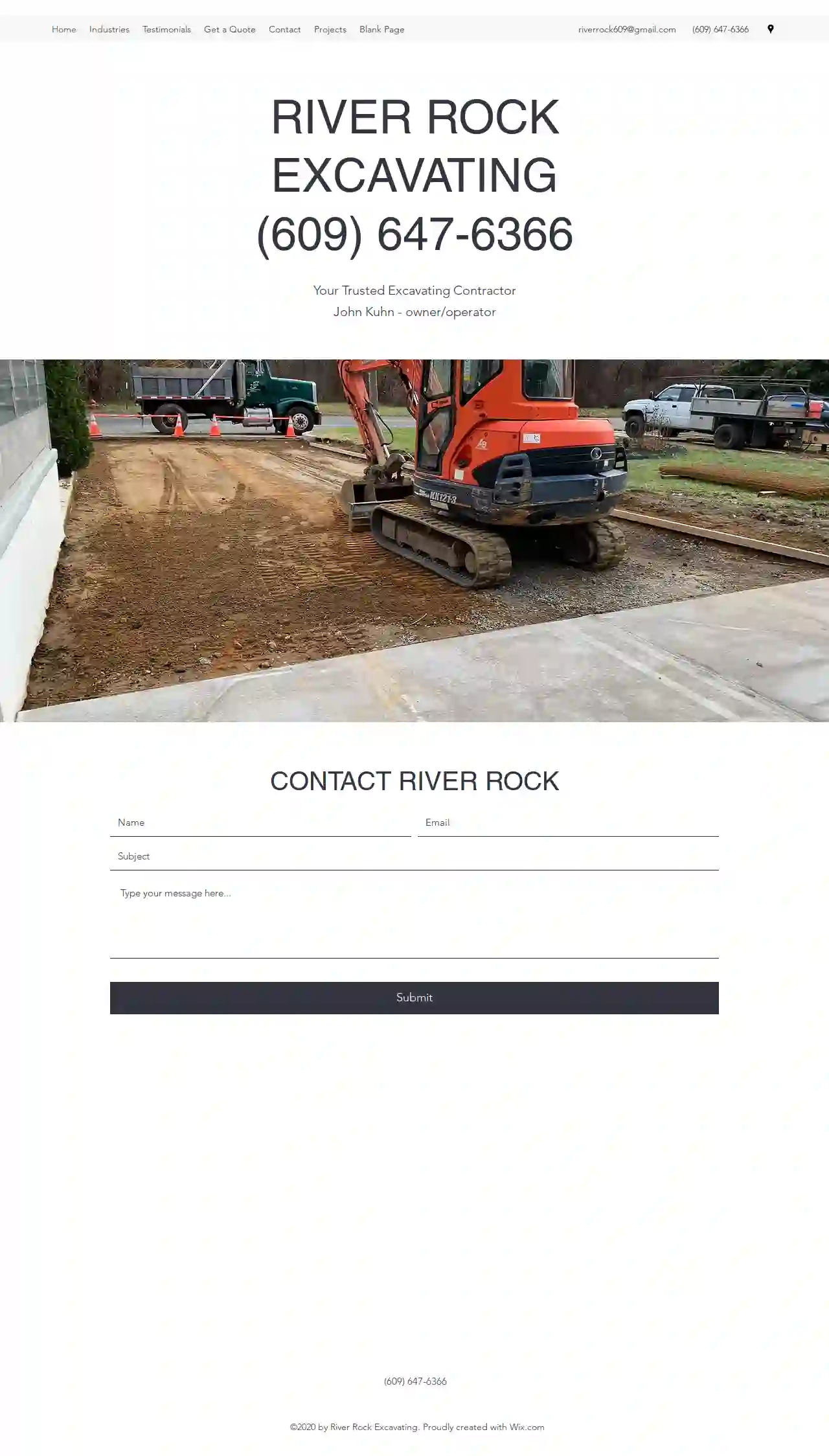Demolition Contractors Yardville
Find the best Demolition Company Near Me in Yardville
Get up to 3 Demolition Contractors Near Me quotes for your project today! Compare profiles, reviews, accreditations, portfolio, etc... and choose the best service.

Excavating Materials & Equipment, Inc.
37 reviews849 Route 539, New Egypt, 08533, USExcavating Materials & Equipment, Inc. (EME) For over three decades, EME has been a leading supplier of sand, stone, gravel, topsoil, and DOT I range products for the construction industry in central New Jersey. We operate two sand and gravel mines, ensuring we can efficiently produce and deliver materials within the tri-state area using our fleet of tri-axle dump trucks and heavy equipment. Our commitment to quality extends beyond material supply. The Plumsted facility is permitted to accept soils and dredge soils for disposal and reuse, adhering to strict DEP and Army Corp of Engineers specifications. Our pugmill blending plant and screening equipment allow us to create customized materials tailored to your specific project requirements.
- Services
- Why Us?
- Gallery
Get Quote
Torshel Tornado Shelters & Safe Rooms
53 reviewsBrick, USThe fastest way to get your storm shelter is by selecting the product or products of your interest. Then, proceed to fill out the contact form online, and a sales representative will be in touch with you. The installation time for the above and in-ground units is 1-3 weeks, depending on your location. Commercial building installation time is 3-6 weeks, depending on the size and your location. If you are building a house, make sure that you order your storm shelter ahead of time. Thank you very much, stay safe! Financing Options We’ve Been Protecting Families & Businesses For Over 9 Years Buying a storm shelter is an important decision. Torshel is committed to helping you choose the best type of shelter for both your home and budget. Both underground shelters and safe rooms offer maximum protection for storms. We encourage our clients to compare the quality of our shelters, methods of installation, and the reputation of the companies. There have been a few cases where other companies have poorly installed in-ground shelters that slip out of the ground. As a result, people can be terribly injured, and in some cases, death may occur. Some companies put profit over the lives of those who will use their products. At Torshel we work to make sure that we save and help protect as many lives as possible. We only install the highest quality storm shelters available in the market and stand behind our work by offering a 10-year warranty. We make ourselves available before and after the shelter’s installation. Commercial and Residential Storm Shelters Welcome to Torshel Storm Shelters, a leading company in the storm shelter and safe room industry. We have the best products, at an affordable price. We proudly install and serve Alabama, Arkansas, Florida, Kentucky, Louisiana, Mississippi, Tennessee, Texas, Georgia, and surrounding states. However, we sell, and ship storm shelters anywhere in the United States. We have clients in Dallas, New York, Miami, Seattle, Los Angeles, and many rural areas around the country. Enjoy your visit to our website. Take a look at our videos, pictures, and testimonials from multiple clients. We know this is an important decision. Know that if you chose us, you will get great customer service and a top-of-the-line storm shelter backed by a 10-year warranty. Torshel offers discounts to customers who purchase two or more units. Protect your family with a Torshel shelter manufactured to withstand EF5 category tornadoes. Torshel offers underground storm shelters and above-ground safe rooms of various sizes that meet or exceed FEMA’s stringent safety standards. Our tornado shelters are also more durable than traditional storm cellars. Let your neighbors, coworkers, and friends know about your purchase of your storm shelter. If they want to buy one during the same delivery and installation trip, everyone can save a lot. A case in point, Mr. Kyle told Mr. Will about his new in-ground shelter; Will liked the product and decided to purchase one. Torshel delivered and installed two units, and offered them discounts! John and George partnered installing a big shelter in-between their houses, both saved and both of their families can have direct access to the shelter. Commercial Storm Shelters The most valuable asset of any company is not its facilities, machines or products. It’s their team of employees, executives, and clients. Torshel can help protect them while at work with a commercial multipurpose storm shelter, panic room, and safe vault in the event of a tornado, hurricane, robberies, shootings, and other types of incidents that may put in danger their safety. You, your staff, and clients will have a peace of mind by having a steel safe room ready for any threating occasion. Storm Shelter in your Garage Torshel storm shelters are made of structural heavy-duty steel and are one of the bests available in the United States. Our storm shelters are well constructed and properly anchored. Such units will withstand an EF5 tornado according to engineers and professionals at Texas Tech University. They are the perfect solution for the elderly, people with disabilities, claustrophobia, and clients who want an easy to reach safe room in their garage. Inground Tornado Shelters For clients that live in mobile homes, or do not have a garage, we offer underground outdoor shelters. These underground units reflect Torshel’s latest technology. They come with a 13” x 13” bullet-resistant window made of 1.5” polycarbonate. The window allows natural light to flow inside the shelter. You won’t feel entrapped. Torshel’s Newest and High Technology Feature! 4-6 cubic yards of 3,000 PSI concrete will keep the unit inside the ground and prevent it from floating. Let’s Keep Your Family Safe The sooner the better, fill our online form and one of our talented representatives will contact you to help you with any question you might have.
- Services
- Why Us?
- Testimonials
- Gallery
Get Quote
Next Level Excavation
54 reviewsEgg Harbor Township, USFamily owned and operated Bring your projects to the Next Level Who we are Doug is the owner and operator of Next Level Excavation. Doug has over 18 years experience in all types of excavation. From small residential projects to large commercial projects we have you covered! Safety is our standard. All employees are O.S.H.A. Certified Fully licensed and insured Over 18 years of experience Services Excavator and skid steer services Brush removal Bulk trash hauling Concrete removal Drainage systems Fence/deck/shed demolition and removal Trenching of any kind Stone driveways Grading Dump trailer rental Material hauling Much more… Prompt and Reliable Satisfaction Guaranteed
- Services
- Why Us?
- Our Team
- Gallery
Get Quote
Dirt Dynasty LLC
54 reviewsBridgewater, New Jersey, USWelcome to Dirt Dynasty, where our foundation is built on the very grounds we work with. Established in recent years by a team of ambitious professionals, we've quickly risen through the ranks to carve our niche in the excavation and masonry service industry. Our journey began when our founders, armed with years of invaluable experience and a vision of independence, decided it was time to stop working under others and instead, build their own legacy. Thus, Dirt Dynasty was born. At Dirt Dynasty, we specialize in a wide array of services designed to meet the diverse needs of both businesses and homeowners alike. Our expertise spans trenching, creating your dream pools and ponds, installing septic tanks, oil tank removals, and the careful demolition of structures. But our craftsmanship doesn’t end there; we also excel in constructing durable retaining walls, crafting picturesque outdoor patios, and setting up functional outdoor kitchens that become the heart of your backyard gatherings. Understanding the needs of our clients extends beyond just the services we offer. We also provide material deliveries including clean stone, fill, mulch, pond rocks, and more, ensuring that your projects have the high-quality materials they require, delivered right to your doorstep. What sets Dirt Dynasty apart is not just our comprehensive service offerings, but our unwavering commitment to satisfaction. We believe in building relationships that go beyond the transaction. Every project we undertake is a testament to our dedication to excellence, attention to detail, and the respect we hold for your vision and space. We strive to not only meet your expectations but exceed them, ensuring that every interaction with us is as seamless and positive as possible. Even if you don’t have an immediate need for our services, we invite you to reach out. Let's lay the groundwork for a future project, discuss your ideas, or simply get to know each other better. At Dirt Dynasty, we believe in fostering connections that might not bear immediate fruit but will grow into strong, supportive relationships over time. Thank you for considering Dirt Dynasty for your excavation and masonry needs. We look forward to the opportunity to work with you and to add your project to the legacy of our dynasty.
- Services
- Why Us?
- Gallery
Get Quote
C H Excavating Contractors Inc
53 reviews11 Old Church Road, Monroe, 08831, USWelcome to C.H. Excavating, Inc. Central Jersey Site Development, Excavation and Demolition C.H. Excavating, Inc. provides Site Development, Excavation, Demolition, Backhoe & Bulldozer, and Land Clearing services in the Central Jersey area. We are a top-rated excavator located in Monroe, NJ. When you need residential or commercial land made ready for construction, C.H. Excavating has the site developers to turn to for experienced and reliable site development and excavation service. Since 1985, residents and businesses in Central New Jersey have been trusting C.H. Excavating, Inc., a family-owned-and-operated company, for all their excavation, demolition and land clearing needs. Through the years we have built up a reputation as being dependable, reasonably priced and always courteous, doing whatever we can to ensure you are satisfied with the quality of your excavation work.
- Services
- Why Us?
- Gallery
Get Quote
Nivek Earthworks LLC
58 reviews3831 Nantucket Dr., Fort Wayne, 46815, USAbout Us Nivek Earthworks LLC is a total site development company serving the greater Fort Wayne community and is owned and operated by Kevin Horgan and Jared Shelton. Not only do Jared and Kevin share a lifelong passion for the excavation industry, but they are also extremely passionate about customer service and take pride in going above and beyond for each of their clients. Together, Jared and Kevin have nearly two decades worth of experience in the construction industry, and have developed a strong skillset for moving dirt. They love what they do and are committed to continually producing exceptional excavation services for the members of the Fort Wayne community. Project Highlights “Often Imitated Never Duplicated” Ready to Start Your Next Project? It all begins with an idea. Whether you are a homeowner or a contractor, we would love to meet with you to discuss your next project. We are here to help during the planning stages of your project and can offer our expertise to determine the best approach, create schedules, and identify possible roadblocks that would normally lead to costly extras if discovered during the construction process. We always offer free estimates and include our detailed plan of the work to be completed. Give us a call or email us today to start the planning process on your next project.
- Services
- Why Us?
- Our Team
- Testimonials
- Gallery
Get Quote
Blackwater Draw Locality 1
4.556 reviews1500 S. Ave K, Lea Hall Room 163, Portales, 88130, USThe Blackwater Draw Museum seeks to foster preservation and education of the heritage of New Mexico, the Southern High Plains, and the greater Southwest through exhibitions, educational programs, collections, and research, while enriching and supporting the educational goals and mission of ENMU. The Blackwater Draw Museum is a small museum located on the campus of Eastern New Mexico University in Portales, New Mexico. The museum is home to a collection of artifacts from the Blackwater Draw National Historic Landmark, a site that has been inhabited by humans for over 13,500 years. The museum offers a variety of exhibits, educational programs, and research opportunities. Visitors can learn about the history of the Blackwater Draw site, the cultures that have lived there, and the archaeology of the region. The museum also has a collection of artifacts from the Casas Grandes culture, a prehistoric culture that flourished in the Southwest from about 1300 to 1450 AD. The museum is open to the public and offers a variety of tours and programs. The museum is a great place to learn about the history and culture of the Southwest. The Blackwater Draw Museum is a great place to learn about the history and culture of the Southwest. The museum offers a variety of exhibits, educational programs, and research opportunities. Visitors can learn about the history of the Blackwater Draw site, the cultures that have lived there, and the archaeology of the region. The museum also has a collection of artifacts from the Casas Grandes culture, a prehistoric culture that flourished in the Southwest from about 1300 to 1450 AD. The museum is open to the public and offers a variety of tours and programs.
- Services
- Why Us?
- Gallery
Get Quote
Will Jackson's Grading
31 reviews1358 New Mexico 313, Algodones, 87001, USWill Jackson's Grading: Your Trusted Partner for Excavation and Grading in Central New Mexico When you're ready to build on a piece of property or need help preparing land that already has a structure on it, contact Will Jackson's Grading. Whether you need an excavating contractor to assist you with trenching or a grading contractor to smooth things over, you'll always get outstanding services with us. Proper land preparation requires backhoes, loaders and dump trucks to complete the process within your timeline. Contact us when you need: Grading services to prepare your land for construction Trenching services to prepare for utility and plumbing installation Demolition, including complete and partial structure removal Site preparation, including erosion control services We're a locally-owned and operated family-run business with decades of experience. We pride ourselves on consistent communication, professional and reliable contracting services, and serving the central New Mexico area.
- Services
- Why Us?
- Gallery
Get Quote
River Rock Excavating
53 reviewsAtlantic City, USRiver Rock Excavating Your Trusted Excavating Contractor River Rock Excavating is a family-owned and operated business serving the [CITY] area. We are committed to providing our clients with the highest quality excavating services at competitive prices. We have a team of experienced and qualified professionals who are dedicated to providing you with the best possible service. We are fully insured and bonded, and we are committed to safety and environmental responsibility. We offer a wide range of excavating services, including: Site preparation Grading Demolition Foundation work Utility installation And more! We are proud to serve the [CITY] community and we are committed to providing our clients with the best possible service. Contact us today for a free estimate.
- Services
- Why Us?
- Our Team
- Gallery
Get Quote
Caruso Excavating Co Inc
4.420 reviews122 Highway 34, Howell Township, 07727, USCaruso Excavating: Building New Jersey for Generations to Come Caruso Excavating is a well-established leader in site development contracting, serving clients in both the private and public sectors throughout New Jersey. Our commitment to excellence has earned us a strong reputation in the industry. We take pride in our talented and experienced team, who provide a professional, hands-on approach to every project. Our philosophy is simple: we want every client to prosper from a quality and expeditious job site. We strive to deliver a completed site that exceeds expectations, regardless of the project size. Caruso Excavating is committed to making every project a winning venture. Our office and site management personnel provide each client with the necessary support to ensure that every phase of construction is performed diligently, safely, and correctly. From equipment and manpower allocation to material procurement, our attention to detail and control over every work element results in a superior and cost-effective project. We complete our projects in an expeditious manner, on time or ahead of schedule. We utilize cutting-edge technology, including the latest computer software and hardware, to prepare estimates, earthwork models, analyze and track costs, and provide scheduling for all projects. Our engineering staff assembles complete breakdowns of all costs and value engineer each site, always keeping the client's budget in mind. Our state-of-the-art shop facility and on-site service trucks are equipped to maintain our massive fleet of machinery. We own some of the most modern heavy construction equipment and trucks in the industry. Safety is a top priority at Caruso Excavating. It impacts our employees, clients, and the general public. We provide training for all levels of management, supervision, and field staff to ensure everyone has the knowledge to recognize and eliminate potential hazards.
- Services
- Why Us?
- Gallery
Get Quote
Over 22,076+ Excavation Companies on our directory
Our excavation pros operate in Yardville & beyond!
ExcavationHQ has curated and vetted the Best Excavation Contractors arround Yardville. Find the most trustworthy pro today.
Frequently Asked Questions About Demolition Contractors
- Size and Complexity of the Structure: Larger and more complex structures, such as multi-story buildings, require more time, labor, and specialized equipment, increasing costs.
- Type of Demolition: Different demolition methods, such as implosion, wrecking ball, or high-reach demolition, have varying costs.
- Material Disposal: Disposal fees for demolition debris can contribute significantly to the overall cost, depending on the type and quantity of materials.
- Location and Accessibility: Demolition in densely populated areas or with limited access may require more planning and specialized equipment, affecting costs.
- Hazardous Materials: The presence of asbestos, lead paint, or other hazardous materials requires specialized removal and disposal procedures, adding to the expenses.
- Clear the Site: Remove all furniture, appliances, personal belongings, and any valuable items from the structure.
- Secure the Perimeter: Fence off the demolition area to prevent unauthorized access and protect surrounding property.
- Disconnect Utilities: Arrange for the disconnection of electricity, gas, water, and other utilities servicing the building.
- Hazardous Material Abatement: If asbestos, lead paint, or other hazardous materials are present, have them professionally removed before demolition begins.
- Notify Neighbors: Inform your neighbors about the demolition schedule to minimize disruptions and address any concerns.
- Obtain Permits: Ensure all necessary demolition permits are in place before starting work.
How much does demolition cost in the USA?
How do I prepare my property for demolition?
How long does a demolition project take?
How do I find demolition contractors near me?
How much does demolition cost in the USA?
- Size and Complexity of the Structure: Larger and more complex structures, such as multi-story buildings, require more time, labor, and specialized equipment, increasing costs.
- Type of Demolition: Different demolition methods, such as implosion, wrecking ball, or high-reach demolition, have varying costs.
- Material Disposal: Disposal fees for demolition debris can contribute significantly to the overall cost, depending on the type and quantity of materials.
- Location and Accessibility: Demolition in densely populated areas or with limited access may require more planning and specialized equipment, affecting costs.
- Hazardous Materials: The presence of asbestos, lead paint, or other hazardous materials requires specialized removal and disposal procedures, adding to the expenses.
How do I prepare my property for demolition?
- Clear the Site: Remove all furniture, appliances, personal belongings, and any valuable items from the structure.
- Secure the Perimeter: Fence off the demolition area to prevent unauthorized access and protect surrounding property.
- Disconnect Utilities: Arrange for the disconnection of electricity, gas, water, and other utilities servicing the building.
- Hazardous Material Abatement: If asbestos, lead paint, or other hazardous materials are present, have them professionally removed before demolition begins.
- Notify Neighbors: Inform your neighbors about the demolition schedule to minimize disruptions and address any concerns.
- Obtain Permits: Ensure all necessary demolition permits are in place before starting work.